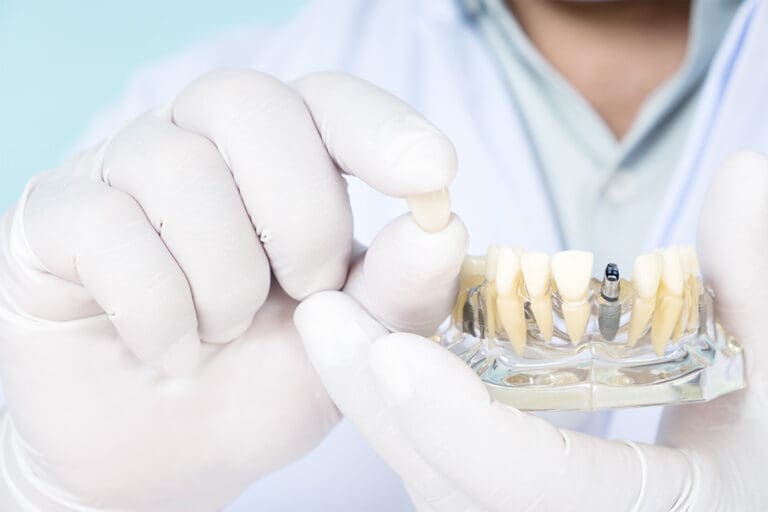Thumb sucking and pacifier use are natural soothing mechanisms for infants and young children. However, continued use of these oral habits as your child grows older can pose potential oral health concerns. As parents, it’s essential to be aware of the dental implications associated with these habits and take proactive steps to help your child break free from them. At Waban Dental Group, our expert pediatric dental team is well-equipped to guide and support families as they navigate these challenges.
In this article, we will discuss the impact of prolonged thumb sucking and pacifier use on your child’s oral development and dental health, signs to look for that indicate it’s time to intervene, and effective strategies to help your child transition away from these habits. With the expert guidance and support of Waban Dental Group’s pediatric dental professionals, you can promote healthier oral habits for your child, ensuring a future of strong and beautiful smiles.
Allow the pediatric dental specialists at Waban Dental Group to partner with your family, providing the education, resources, and support necessary to address thumb sucking and pacifier use while fostering a lifetime commitment to exceptional oral health.
Dental Implications of Prolonged Thumb Sucking and Pacifier Use
Understanding the potential dental consequences of prolonged thumb sucking and pacifier use can help you take proactive steps to protect your child’s oral health:
1. Malocclusion: Persistent thumb sucking or pacifier use can lead to misaligned teeth, causing an overbite, crossbite, or open bite, which may require orthodontic treatment to correct.
2. Altered Palate: Thumb sucking, in particular, can exert pressure on the roof of the mouth, causing a narrow or high-arched palate that may impact your child’s speech or swallowing.
3. Speech Issues: Both thumb sucking and pacifier use can contribute to speech problems such as lisps or difficulties with articulation as a result of altered dental development.
4. Oral Hygiene Challenges: Misaligned teeth can pose challenges for brushing and flossing, potentially leading to an increased risk of tooth decay or gum disease.
Signs It’s Time to Intervene
While many children naturally wean themselves off of thumb sucking and pacifier use, it is essential to recognize when intervention may be necessary:
1. Persistence Beyond Age 3: If your child continues to suck their thumb or use a pacifier beyond the age of 3, it may be time to take action, as the risk of dental complications increases.
2. Visible Dental Changes: Be vigilant for noticeable shifts in your child’s teeth alignment or bite, as these may indicate the need for intervention.
3. Increased Frequency or Duration: If your child significantly increases how often or how long they engage in these habits, intervention may be necessary.
Strategies for Breaking the Habit
With patience and understanding, you can help your child transition away from thumb sucking and pacifier use by implementing these strategies:
1. Positive Reinforcement: Praise your child for periods without thumb-sucking or pacifier use, and consider employing a reward system to motivate them further.
2. Identify Triggers: Observe when your child is most likely to engage in the habit (e.g., during stress, fatigue, or boredom) and provide alternative comfort or distractions.
3. Gradual Weaning: Reduce pacifier use incrementally by setting limits, such as only allowing it during bedtime or naptime, before eliminating it entirely.
4. Oral Appliances: In some cases, your pediatric dentist may recommend an oral appliance to discourage thumb-sucking or pacifier use, particularly when other interventions have been unsuccessful.
Collaborating with Waban Dental Group’s Pediatric Dental Professionals
Our team at Waban Dental Group is committed to providing comprehensive care and support for your child’s oral health journey, including the challenges of thumb sucking and pacifier use:
1. Expert Guidance: Our pediatric dental specialists have extensive training and experience dealing with thumb sucking, pacifier use, and their associated dental implications, ensuring your child receives the most appropriate care.
2. Personalized Strategies: We understand that every child is unique, and we will work with your family to create tailored interventions that address your child’s specific habits and needs.
3. Preventive Care and Monitoring: Regular dental visits with our pediatric dental professionals can help detect and address any dental issues arising from thumb sucking or pacifier use, allowing for early intervention and treatment.
4. Ongoing Support: Waban Dental Group is dedicated to providing long-term support and resources for your family, empowering you to make informed decisions and take charge of your child’s oral health.
Nurturing Healthy Oral Habits for a Future of Beautiful Smiles
Supporting your child in breaking the habit of thumb-sucking or pacifier use is an essential part of promoting healthy oral development and fostering a lifetime commitment to outstanding oral health. By understanding the dental implications, recognizing the signs of when to intervene, and employing effective strategies in collaboration with Waban Dental Group’s pediatric dental specialists, you can ensure your child is on the path to a future of strong, radiant smiles.
Schedule an appointment with our pediatric dental experts today to discuss your child’s thumb-sucking or pacifier habits and explore the comprehensive pediatric dental services offered at Waban Dental Group. Together, we can confidently guide your child towards healthier oral habits and a bright, joyful future of exceptional dental health.






